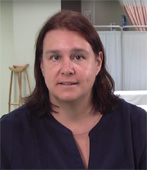
Full Professor
Contact details (Research)
Regular Researcher,
Centre for Interdisciplinary Research in Rehabilitation of Greater Montreal (CRIR),
Centre de réadaptation Lucie-Bruneau
Contact details (School of Rehabilitation)
T 514 343-2192
F 514 343-2105
annie.rochette@umontreal.ca
Program
Ergotherapy
Education
- B.Sc. Occupational Therapy, McGill University (1993)
- M.Sc. Clinical Sciences (Geriatrics), Université de Sherbrooke (2000)
- Ph.D. Clinical Sciences, Université de Sherbrooke (2004)
- Postdoctorate, Rehabilitation, McGill University (2006)
Current research projects
- Updating and development of the knowledge transfer web site on stroke rehabilitation strokengine.ca
- Actual practices of occupational therapists holding a professional master
- Improving Stroke Rehabilitation Services Through Evidence-based Practice and Knowledge Translation
Selected publications
- Rochette, A., Korner-Bitensky, N. & Thomas, A. (May 2009). Changing clinicians’ habits: is this the hidden challenge to increasing best practices?Disability & Rehabilitation – Clinical Commentary, 21:1-5. [Epub ahead of print].
- Rochette, A., Gaulin, P. & Tellier, M. (June 2009). Could stroke trigger be prevented by healthy family relationships? International Journal of Rehabilitation Research, 32(2):173-7.
- Rochette, A., Korner-Bitensky, N. & Desrosiers, J. (2007) Actual versus best practices for families post-stroke according to three rehabilitation disciplines. Journal of Rehabilitation Medicine, 39 (7), 513-519.
- Rochette, A., Bravo, G., Desrosiers, J., St-Cyr/Tribble, D. & Bourget, A. (2007) Adaptation process, participation and depression over six months in first-stroke individuals and spouses. Clinical Rehabilitation, 21 (6) 554-562.
- Rochette, A., Desrosiers, J., Bravo, G., St-Cyr/Tribble, D., Bourget, A. (2007) Changes in participation level after spouse’s first stroke and relationship to burden and depressive symptoms. Cerebrovascular Diseases,24, 255-260.
Research interests
- Social participation
- Coping process
- Support
- Information
- Education
- Pedagogy
- Cerebral vascular accident
- Close relatives
